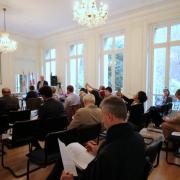
- El tamaño del viñedo mundial se mantiene en 7,5 millones de hectáreas en 2016: la superficie vitícola de China continúa en crecimiento (+ 17 mha), lo que confirma su lugar de 2.° viñedo mundial.
- 267 millones de hectolitros de vino se produjeron en 2016, un retroceso del 3 % con respecto al año anterior.
- 242 millones de hectolitros de vino se consumieron en 2016. Un consumo que se ha estabilizado desde la crisis económica de 2008.
- Intercambios mundiales de vino: volúmenes en ligera disminución (104 millones de hectolitros, -1,2 %) pero con un mayor valor (29 000 Mill. EUR, + 2%).
Coyuntura vitivinícola mundial - informe
Presentación PPT [FR]
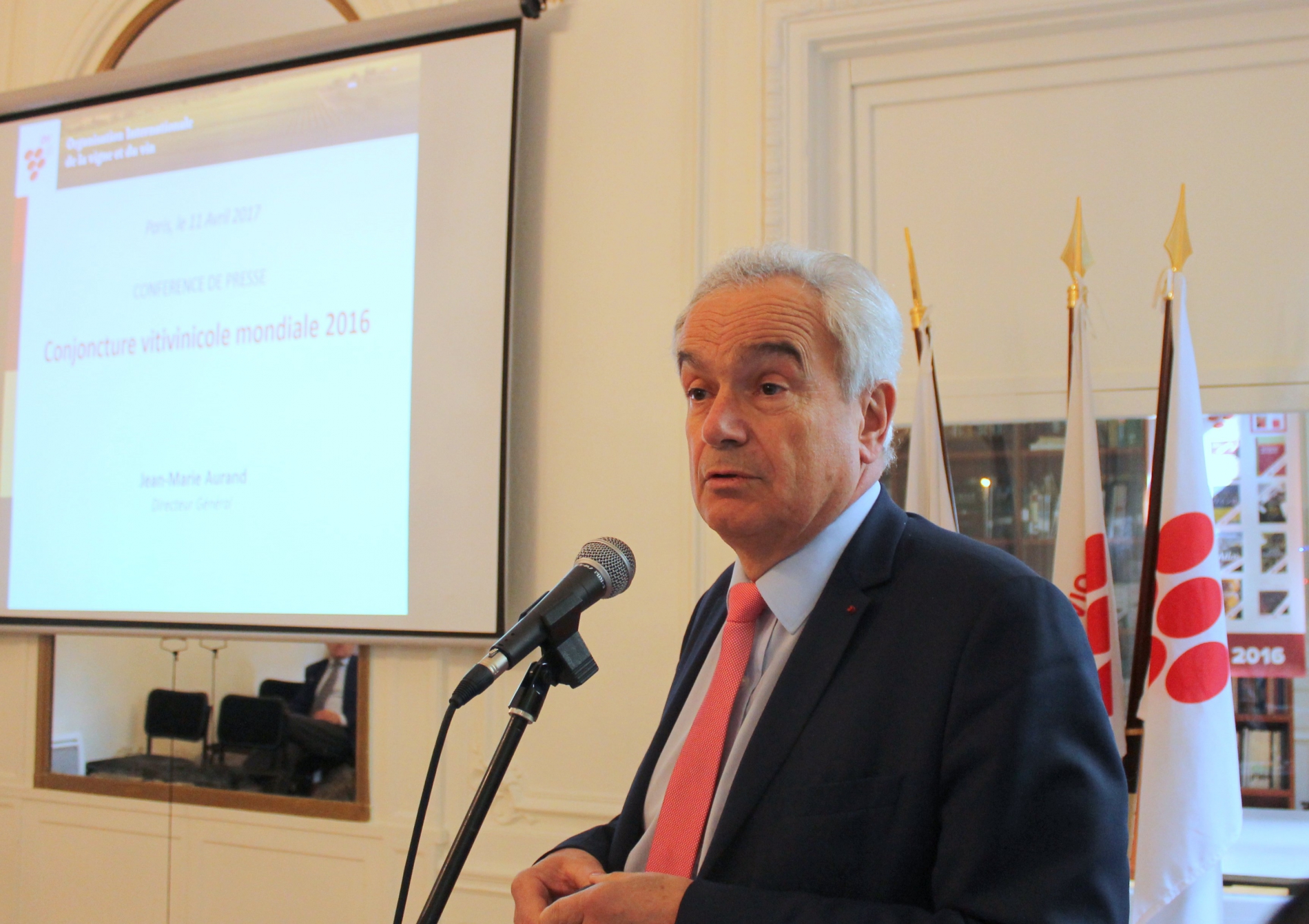

Se trata de la sexta edición de la norma mundial elaborada por la Organización Mundial de Aduanas (OMA), aprobada inicialmente en 1983 y utilizada por más de 200 países en el marco de uniones económicas y aduaneras para clasificar las mercancías objeto de intercambio comercial a nivel mundial.
La versión de 2017 de la nomenclatura del SA incluye 5387 códigos de 6 dígitos (5205 en la versión de 2012). Los países firmantes se basan en el SA para establecer sus aranceles aduaneros y elaborar las estadísticas del comercio internacional.
En total, la versión de 2017 de la nomenclatura del SA incluye 233 conjuntos de enmiendas, de los cuales 85 corresponden al sector agrario, como la propuesta presentada por la OIV a la OMA en 2013.
La partida 22.04 se subdividía en dos subpartidas: la 2204.21, correspondiente al vino en envases de 2 litros o menos, y la 2204.29, correspondiente al vino en envases de más de 2 litros, que suele denominarse “vino a granel”. Con la nueva subpartida 2204.22, los vinos en envases de entre 2 y 10 litros no tendrán la consideración de graneles, sino de productos envasados.
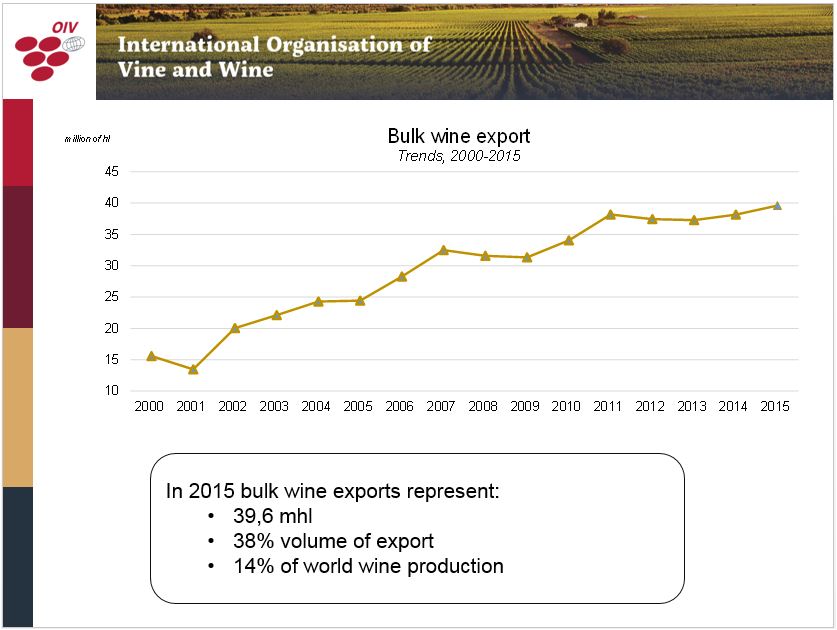
Para Jean-Marie Aurand, director general de la OIV, “el cambio de nomenclatura propuesto por la OIV contribuye a la transparencia y la claridad de las estadísticas del sector y permitirá estimar con mayor precisión los datos mundiales relativos a este tipo de productos”.
Las exportaciones de vino a granel están aumentando considerablemente; en 2015, se alcanzaron los 39,6 millones de hectolitros, lo que representa un 38 % del volumen total del comercio (estos datos, basados en la nomenclatura de 2012, se refieren a vinos en envases de más de 2 litros).
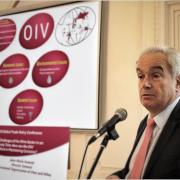
El director general de la OIV participó el 10 de abril, en Bruselas, en la conferencia de la Federación Internacional del Vino y de las Bebidas Espirituosas (FIVS).
En esta ocasión, la cita anual estuvo dedicada a los grandes retos que enfrenta el sector vitivinícola en un contexto internacional incierto y en plena evolución.
Los diversos talleres permitieron abordar numerosos temas de actualidad: cuestiones medioambientales, comportamiento y expectativas de los consumidores, responsabilidad medioambiental y social de las empresas.
Jean-Marie Aurand, como introducción a la conferencia, realizó una presentación de las grandes tendencias observadas en el ámbito vitivinícola a escala mundial y puso de manifiesto los principales retos de cara al futuro en materia económica, social y medioambiental. Además, resaltó el papel de la OIV en la tarea de acompañar al sector vitivinícola en estas grandes mutaciones.
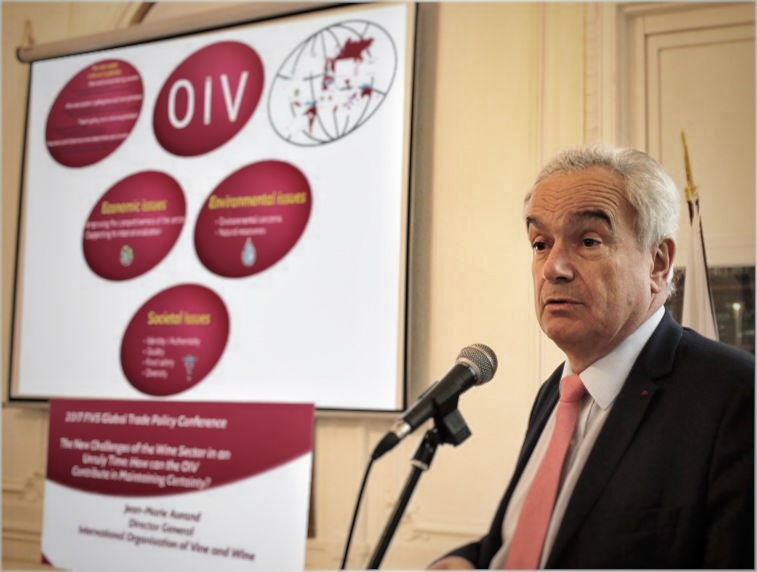
El director general de la OIV también expresó su satisfacción por la calidad de las relaciones entre ambas organizaciones, al subrayar la implicación de los representantes de la industria en los trabajos de la OIV y su aporte siempre constructivo a la experiencia colectiva, gracias a la calidad de observador de la que goza la FIVS.
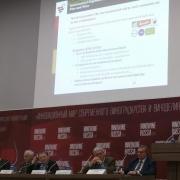
Monika Christmann presentó a la OIV, sus objetivos, su función, así como los datos estadísticos sobre el estado actual del mercado vitícola mundial.
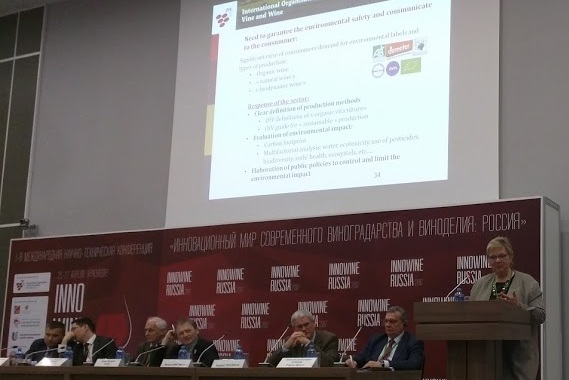
En el marco de esta conferencia, también tuvo lugar una reunión abierta al público del Comité Nacional para la Coordinación de Cooperación con la OIV. Esta reunión suscitó un vivo interés entre los participantes y actores del sector. Tatiana Svinartchuk presentó los procedimientos de funcionamiento de la Organización, así como los principales documentos normativos debatidos y elaborados por la OIV.
Se presentaron y se debatieron los retos de cooperación internacional en la elaboración y aplicación de normas de producción y comercialización del vino y otros productos vitivinícolas internacionales. Más específicamente, se destacó la importancia de la aplicación der las normas internacionales en la normativa nacional para evitar posibles problemas de cumplimiento para los productores locales, pero también problemas comerciales para los importadores y exportadores.
La formación de los especialistas en enología y viticultura se vio como un punto clave. La presidenta de la OIV hizo hincapié en la importancia de los programas internacionales de intercambio de estudiantes.
Después de la conferencia, se organizaron visitas a viñedos rusos (Abrau-Durso, Vedernikov, Usadba Divnomorskoye, Elbuzd, Lefkadia) para los representantes de la OIV y para los participantes en la conferencia. La presidenta de la OIV se mostró satisfecha de un nivel técnico muy elevado y una excelente calidad de los vinos.
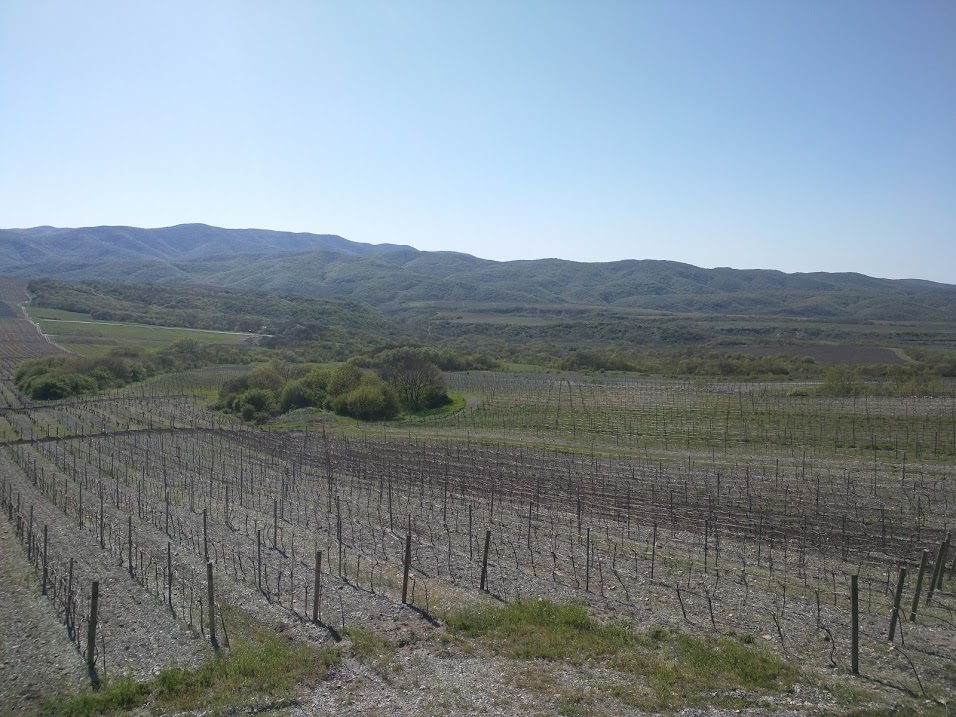
También se espera que esta visita sirva para impulsar la participación de la delegación rusa en los trabajos de la OIV.

En el transcurso de este viaje —muy bien organizado por el director general del Consejo, Gabriel Padilla Maya—, Jean-Marie Aurand efectuó una presentación de la OIV y de sus misiones ante los profesionales responsables del sector vitivinícola mexicano, unos meses después de la adhesión de México a la OIV. También visitó las principales regiones vitivinícolas de ese país: Sonora, Parras, Coahuila, Querétaro, Baja California, Valle de Guadalupe y Valle de Santo Tomás.
Además, durante una reunión de presentación en el Senado del proyecto de ley para el desarrollo de la industria vitivinícola nacional, que apunta a definir el marco general de intervención del Estado en favor del sector vitivinícola, y en presencia de los representantes de los gobernadores y del Consejo Mexicano Vitivinícola, el director general de la OIV destacó la importancia que reviste dicha iniciativa, pues permitirá, como ocurre en numerosos países, acompañar el auge de la vitivinicultura en México.
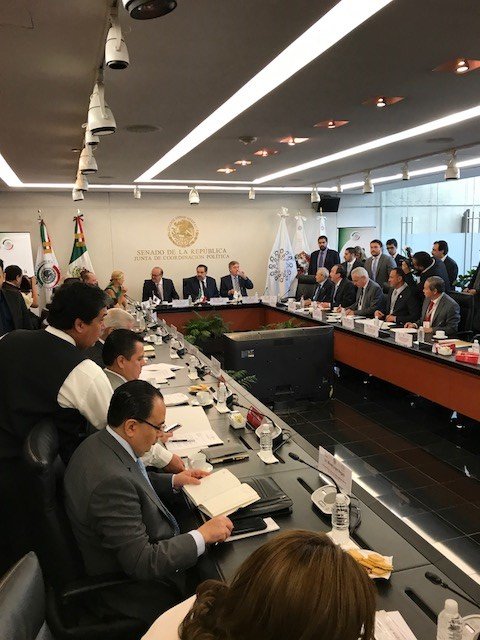
Ante los representantes de los productores de uvas de mesa y pasas, Jean-Marie Aurand presentó el último estudio de la OIV, realizado conjuntamente con la FAO, sobre el panorama mundial del mercado de las uvas de mesa y las pasas, destacando las oportunidades para los productores mexicanos.
Con una producción anual de 260 000 toneladas de uvas de mesa, que ha aumentado un 25 % desde el año 2000 y de la cual el 60 % se exporta, México se ha convertido en un importante actor dentro del mercado internacional. Su producción está muy bien valorizada, pues llega al mercado fuera de temporada en Europa (de mayo a julio).
La producción de pasas, por su parte, aumentó un 225 % desde 2000 y llegó a 14 000 toneladas en 2015.
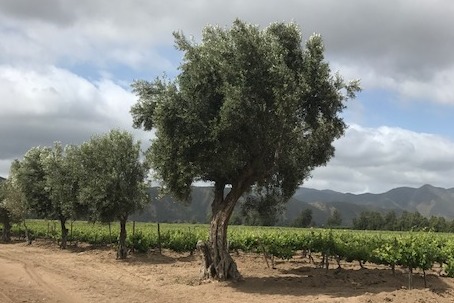
Impulsada por una fuerte demanda interna, que propició un crecimiento del 12 % anual del consumo en los últimos 10 años, la producción de vinos registra un notable desarrollo. Una enorme cantidad de empresas vitivinícolas instaladas en 11 estados mexicanos producen anualmente cerca de 200 000 hectolitros de vinos de muy buena calidad y de gran diversidad.
El desarrollo y la modernización del sector se ven fomentados colectivamente por el Consejo Mexicano Vitivinícola con el respaldo del Gobierno.
Durante la visita a la Universidad Autónoma de Baja California, organizadora del concurso internacional Ensenada, Tierra del Vino, los promotores manifestaron su intención de solicitar el patrocinio de la OIV para las próximas ediciones.
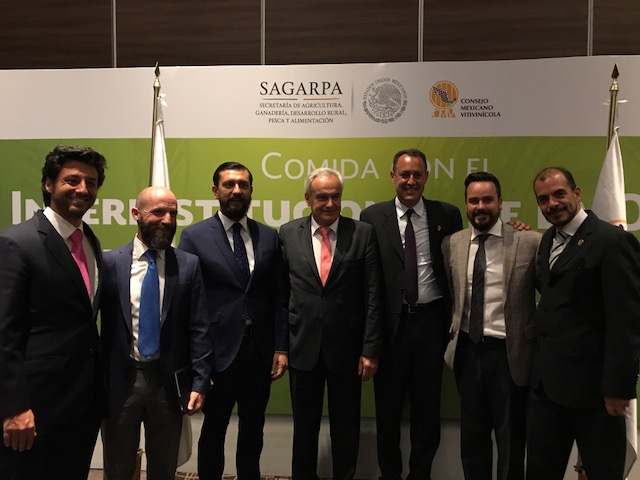
En el transcurso de una reunión presidida por el subsecretario de Agricultura, el Lic. Jorge Armando Narváez Narváez, quien es, además, delegado ante la OIV, Jean-Marie Aurand presentó a los responsables del sector vitivinícola las grandes tendencias del mercado internacional del vino y los principales retos para el futuro, además de destacar las oportunidades para México. Al igual que el subsecretario de Agricultura, el director general se mostró complacido por la adhesión de este país a la OIV, una decisión muy importante para el futuro de la viticultura mexicana. También acogió con beneplácito la participación activa de los expertos mexicanos en los trabajos de la OIV, impulsada por el Consejo Vitivinícola e incentivada por el Ministerio a través del Comité Interinstitucional de la Viña y el Vino recientemente creado.
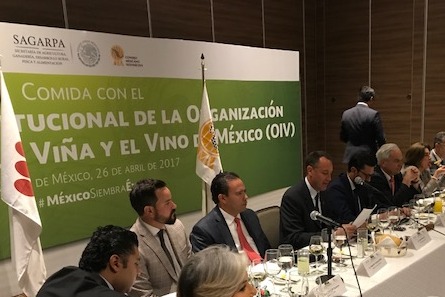
Por último, el subsecretario de Agricultura anunció que su país planea organizar próximamente una presentación del vino mexicano en la sede de la OIV.